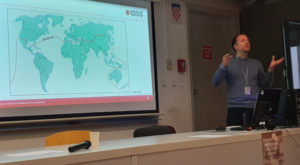With a focus on the East of Europe, participants of the “Postcolonial, Decolonial, Postimperial, Deimperial” conference unpacked whether and how colonial and imperial experiences have reverberated across histories, institutions and literatures.

From 14 to 17 April 2024, scholars from across the humanities and social sciences met at the University of Rijeka in Croatia to discuss latest insights into the meanings of (de/post)coloniality and (de/post)imperiality.
As part of a panel on “Ottoman Afterlives”, Dr Sebastian Haug presented a paper entitled “Decolonial donor? Turkish development cooperation framings between postcolonial solidarity and neo-imperial grandeur”. Based on research on the position of Turkey – officially called “Türkiye” since 2021 – at the margins of the Global South, Haug showed how the Turkish government under Recep Tayyip Erdoğan has tried to combine two identify framings many find irreconcilable. On the one hand, Turkey has tried to project itself as a donor, providing data on its Official Development Assistance to the OECD. On the other hand, it has presented itself as a decolonial and anti-imperial voice that challenges the dominance of established (Western) powers through South-South solidarity. Haug showed how, through claims to civilizational exceptionalism, official Turkish sources have made the case for Turkey acting as a paternalistic “conscience of the world” in line with notions of Ottoman grandeur.
Other panel papers contributed to a multi-faceted discussion of Ottoman legacies in the Levant, in and through modern Turkish literature, and with regard to migration dynamics at the Turkish-Greek border. At IDOS, the examination of Turkey’s global role is part of a broader research agenda that focuses on ongoing power shifts in the international system, including with regard to China.

Schreibe einen Kommentar